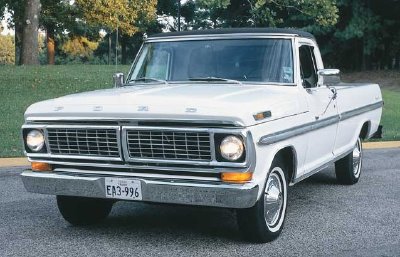Disclaimer: It is a total coincidence that I have the second post about Ford Motor Company in as many weeks. I am not on the Ford payroll. In fact, I have a Chevy truck. So there.
Mission statements, culture maps, or an articulation of the 'vision' or purpose of an organization - these are all fairly common in organizations and often mocked or at least ignored. Usually they are either so vague and obvious that they are meaningless - 'We strive to delight our customers every day', or are so specific and drawn-out that they read like marketing brochure copy - 'Our goal is to be the top-rated supplier of industrial fasteners, ties, and aluminum sprockets to the machine, engine, and turbine sub-assembly markets that we compete in around the world.'
So when you come across a mission statement or a list of operating principles that actually doesn't suck, and doesn't take itself too seriously, (I think a pre-requisite for 'not sucking') that are a part of an organization's DNA it is fairly noteworthy or at least interesting.
So the connection back to Ford, (and once more for clarity, I am a Chevy guy), is this piece from Forbes - Are You Manly Enough to Own a Ford Truck?, that provides a glimpse into some of the unique rules/expectations/operating principles that are apparently a part of the makeup of not just people who buy Ford trucks, but as you will see from some of the items on the list, also the people that work at Ford building the trucks.
Here are a few selections from the list - and I'll have some comments after the break:
- Raw meat is acceptable team food. Raw fish is not.
- Roller luggage is expressly forbidden, except for golf bags.
- Earplugs are not permitted at NASCAR races or National Hot Rod Association events.
- No whining!
- Airport trams and moving sidewalks are off-limits in order to promote team conditioning.
- No wimpy cell phone ring tones.
- Jackets or ponchos are acceptable rain gear. Umbrellas are not.
- True BFT Truck Team members wear real jeans, not skinny jeans.
- For flights departing at 7 a.m. or later, an office appearance is expected prior to departure. Red-eye flights are expected to maximize productivity.
- There are no “travel days.”
A pretty cool list, if not totally serious, but it does go quite a bit further than most standard mission statements or organizational philosophy statements do to better describe the type of people that will actually be likely to succeed, (or at least get along), in the group.
I like the list because it is descriptive, specific, and funny. The kinds of traits that we often find lacking in most corporate-speak that passes for HR and organizational communication. Are these 'real' rules for working on the Ford Trucks team? Are they actually used in hiring and retention discussions?
I don't know for sure, but that doesn't make them less cool, and it doesn't stop any of us from thinking about our version of a similar list of philosophies, expected behaviors, and personality types of the people that we want to work with and that will succeed.
Have a great week everyone!